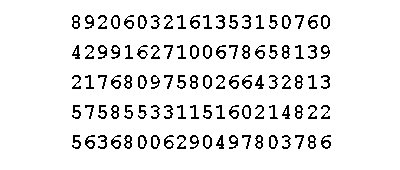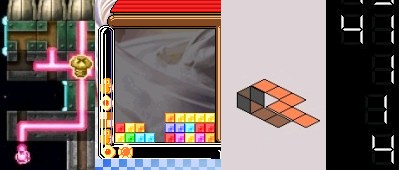Interesting Choices: Interesting Gameplay pt.8
 Saturday, April 23, 2011 at 8:37PM
Saturday, April 23, 2011 at 8:37PM The fourth and final design feature that can support interesting choices or create interesting gameplay is random elements. This one will take some explaining considering that random elements are widely unappreciated and misunderstood among gamers.

Adding random elements to a game is a simple way of adding unpredictable factors into gameplay. So in a turn-based game of interesting choices (only stressing knowledge skills) even perfectly informed players may be forced to adapt or anticipate changes to the battle conditions depending on what comes out of the radomizer. Some claim that games with random elements cannot be games of perfect information. We'll examine this idea in greater detail below.
When a random outcome can swing the tide of battle in or out of a player's favor, more cautious players tend to play a more reserved. If the random factor is significant enough, players will think twice about even running a dominant strategy. In this way, random elements can limit the effectiveness of dominant strategies and therefore aid in the emergence of interesting choices.
Some gamers hate random elements. With a negative tone they call it luck or hax (as if some outside person hacked into their game session with the malicious intent on messing things up for them). From the Smash community to many outspoken members of the larger gaming world, many gamers have a very negative view of random. In this case I don't mean random level generation or random bonuses. I mean the kind of random that affects the action-reaction pairs of a game's core interactions. In some ways I don't blame them. When designed poorly random elements can really take the control away from the players. When the control goes so does interesting choices and agency. But I don't worry about such grim possibilities. Outside of casinos and coin flips, I can't think of many games that seem to be skill based but end up being mostly or purely chance based because of how its random elements are designed.
My Random Defense
In general I think the view that random elements are inherently bad is myopic at best and foolish at worst. To present my "random defense" I'll start with this definition from dictionary.com: "proceeding, made, or occurring without definite aim, reason, or pattern."
This definition is a little squishy in that it can describe events that are not random at all. This is why I like it. Consider a very complex number generator. This machine looks at 100 different individual number values to generate an output number. To us who do not know that the machine is simply adding up the values and taking the first digit, the number it spits out seems completely random. And even if we knew all 100 factors it looks at, we wouldn't be able to do the math fast enough to make any kind of timely, informed decision. So even with complete knowledge of the machine because we can't really make a pattern or determine the clear reason behind the numbers it spits out, we conclude that it's aimless or random. Technically it isn't truly random (for true random go to random.org). All computers simply use a mathematical formula to generate a "random" number. We still call it random. The take away from this example is that what we know and our frame of reference is important to our considerations.

So I offer these examples to complicate your conception of random in video games:
Example 1:

It's funny how the percentage chance a result will occur changes how we feel about our chances and evaluate our actions. Recall an article I wrote titled Random Knowledge Quirks. In it I discuss how people can think a random element is more than it is. The following are examples of how the frequency of success can influences our perception. Use the randomizer widget above to see how frequently you hit or miss.
- 1% chance actions happen so infrequently that we tend to forget about them and rarely plan for them. Tripping in Brawl is a random event that only happens on 1% of all dashes. Yes, one can avoid all tripping by not dashing, but the chances are so infrequent that we just dash anyway. Tripping always seems to catch me off guard.
- 5-15% chance actions are still too infrequent to bank on them occurring. However, they happen enough that it's not a big surprise. Most Pokemon attacks have a 6.25 critical-hit percentage. Critical-hits simply double the damage of an attack. Critical-hits (crits) are an abstraction of actual battle conditions where an attack hits an exposed weakspot on the target. In real-time games players take the occasional devastating hit when they're distracted or overwhelmed. Remember that being overwhelm helps make "anything possible." So for turn-based games like Pokemon, crits achieve a similar "anything can happen" feel. Furthermore, crits give a slight advantage to offensive players. This biased design is common in many competitive games. You'll never crit a recovery move like Rest, Roost, or Recover. So if there's a stalemate between a recovering Pokemon and an attacking one, the attacker will probably win because of the eventual critical-hit.
- 20-35% chance effects are frequent enough that players beginning counting on them. Though they won't happen most of the time, you'd expect after 5 attempts you'll be successful at least once. In some cases this is great! For example having a 1/5-1/3 chance that the opponent will get paralized from your attack is just the right kind of fraction that is easy to work with.
- 50% chance effects are deceptive to many players. With equal chances to success or fail, one might expect to succeed about half the time. Such results are likely to be the case after thousands of attempts. But on a smaller scale, you can easily lose 6 times in a row. This can seem infuriatingly unfair.
- 75-95% chance effects make us a bit overconfident. Because these mechanics work most of the time we get comfortable relying on them and making strategies around them hitting. Some of the most powerful attacks in Pokemon have accuracy drawbacks. Take fire blast. With a 85% accuracy, a missed attack can be a harsh reminder of the move's drawbacks.
In the end, if you're the kind of player who doesn't want to take any chances, then you should pick the strategies that minimize percentage effects and stay away from many action games. If you choose to play just don't get mad when you fight someone bold enough to take the good and the bad to work together a strategy that compensates for any unlucky occurrences. To a good strategist, everything can be calculated. And a bit of random in a game system can separate the real strategists from the random wannabes.

